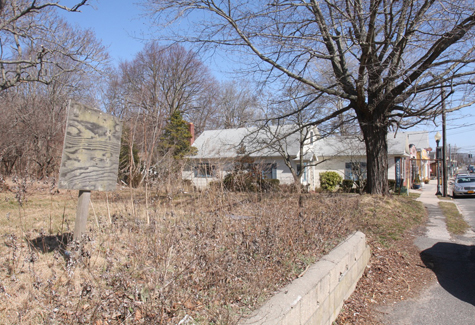Tax projections for Village at Jamesport proposal off by $175K

The final environmental impact statement for Jul-Bet Enterprises’ Village at Jamesport appears to have made a mathematical error in computing the projected tax revenues it will generate.
As a result, the project’s estimated tax contribution is listed at almost twice what it should be.
Jamesport resident Larry Simms, who has opposed the 42,000-square-foot project on the north side of Route 25 in Jamesport, pointed out the mistake in an email to the News-Review this week.
The FEIS was done for the applicant by the Hauppauge-based VHB Engineering, Surveying and Lanscape Architecture firm, and unanimously accepted by the Riverhead Town Board on Dec. 20, 2011. The board on March 6 also adopted a findings statement on the project, which found that the issues raised in the FEIS either had no major impact or could be adequately mitigated.
The FEIS lists projected yearly tax revenue from the Village at Jamesport at $1,735 in county taxes, $49,736 in Riverhead taxes, $110,417 in school and library taxes and $15,080 in other property taxes.
But when the VHB firm that prepared the study totaled those numbers, it came up with $348,639 instead of $176,968.
The News-Review sent an email to Robert Eschbacher from VHB’s Hauppague office seeking comment, but he has yet to respond.
VHB is also doing the EPCAL reuse study for Riverhead Town.
Supervisor Sean Walter said the error wouldn’t have affected his vote in adopting the findings statement.
The only issue before the Town Board will be whether to grant a special permit to allow professional offices and bistros in some of the 10 proposed buildings, instead of permitted uses such as retail. The Town Board has yet to vote on the special permit. If it approves the special permit, the next step will be for the town Planning Board to vote on the overall site plan application.
“The Town Board wasn’t looking at the projected taxes,” Mr. Walter said. “We were looking at the impact of a bistro and professional offices and if those impacts were larger than permitted uses. Retail is allowed as of right there.”
Mr. Simms, who has now started a petition against the project, disagrees.
“While net economic advantage from the proposed special uses is difficult to imagine, even using the erroneous EIS revenue projection, when that number is halved, it’s simply unthinkable that issuing these special use permits would benefit the community,” he wrote in an email. “The permits must be denied.”
Mr. Simms also feels that the two proposed bistros will not be able to succeed economically using the town’s 50-seat maximum for each of the two 4,000-square-foot buildings.
“A top national food service consultant was unable to cite a single example of a viable restaurant, anywhere, with anything close to these numbers,” he wrote. The square foot per seat ratio is much lower in most restaurants.”







